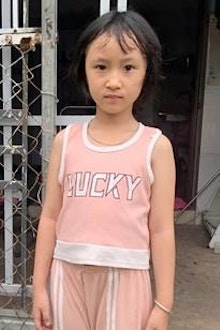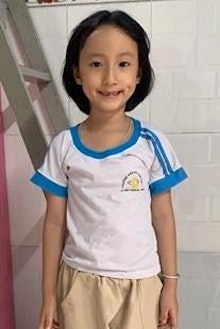When Tú dropped out of school in Vietnam, it seemed her life would play out the same as her mom’s — she’d sell lottery tickets on the side of the road, and never escape the cycle of poverty. But through vocational training funded by Holt donors, Tú is now learning how to style hair and nails — and earn a sustainable income. And her life, just like her clients, is becoming all the more beautiful.
A 4-year-old stands on a busy sidewalk in Vietnam. She sees a group of strangers and walks up to them. Wordlessly, she holds up some pieces of paper and goes around to them one by one. They’re careful not to make eye contact with her. They shoo her away. She goes back to the street where her mom is waiting, and they keep walking, looking for more people to approach.
This was Tú’s life from its earliest stages. At just 4 years old, she began selling lottery tickets alongside her mom. Selling lottery tickets earns very little income, and the tickets hold very little value for the people who buy them. As a result, selling lottery tickets is akin to panhandling. People buy them out of compassion for the person selling them.
And out of desperation, parents often recruit their young children to sell them — hoping to invoke more pity, compassion and sales.

No one chooses this life. Tú’s mom sells lottery tickets because she has few other options. Her husband is no longer in the picture. She lives with her two children and four other family members in a charity house built by the government. Their entire household income is $473 USD a month, which includes a salary Tú’s uncle earns from his construction job — and the $4 a day that Tú’s mom earns from selling lottery tickets and also shelling cashews. As she grew, Tú helped support her family — also contributing ticket earnings of about $4 per day. But the family’s income barely covered the needs of seven people.

Tú is 16 now, and on a rainy day in December our Holt team walks down the trail leading to her house. Their home is surrounded by ponds used for raising and harvesting shrimp and fish. A narrow stretch of grass between the pond and a concrete wall leads to their tall brick home. Everyone is soaked by the time we reach it.

Tú comes to greet us. She’s bubbly and welcoming — her cute bangs framing a face with bright eyes and a warm smile. She’s excited to tell us about herself and how Holt donors have been helping her.
Dropped Out of School
A few years ago, when she was just 12 years old, Tú decided to drop out of school.
“I went to school, but I don’t achieve good grades, I didn’t achieve a good outcome,” says Tú, “that’s why I decided to not continue school.”
This is a common occurrence for children living in poverty who aren’t doing well in school, and who don’t have the support they need to continue. If a child is part of a wealthier family, their family may pay for additional tutoring — or even go to a private school where they’ll receive more support in their education. But this is not an option for children from poor households. Many children simply drop out and start working to support their families.
This was Tú’s reality.

Tú decided to continue selling lottery tickets with her mom. But she soon found that an already difficult sell was only becoming harder.
“I was happy because I could accompany my mom,” Tú says about selling lottery tickets. “But I was not happy because, you know, the sell is very slow.”

Over the past several years, the Vietnamese government has discouraged the buying and selling of lottery tickets — especially with children. While not a viable option for people to rise out of poverty, when children engage in the practice, it’s also essentially child labor. Suddenly, Tú and her mom weren’t selling as much. Trying to abide by the government’s new laws, people weren’t buying lottery tickets anymore.
As we speak with Tú in the back, open-air room of her house, the rain begins to pound even harder — making loud thumping noises on the tin roof. While we’re talking, her brother comes home from school. Although he’s 14 now, he’s small and appears to be about 8 or 9 years old. This is due to severe malnutrition. When a child doesn’t have enough food to eat, they’re often stunted in their growth. In impoverished communities across Vietnam, many children have little more than rice to eat. They rarely get enough protein and other vital nutrients. And they quite often go without meals. Both Tú and her brother have likely skipped many meals through their childhood. Their mom is tiny, too. Less than 5 feet tall and extremely slight. This is what poverty looks like.
And poverty, it seemed, is what Tú was destined for.
Holt Vocational Training in Vietnam
Tú had a sixth-grade education. And now her plan for making money wasn’t going to work, either. But Tú was smart and determined — and she kept her eye out for any opportunity to escape her situation.
“When I was selling the tickets, I found I could not earn much income,” Tú says. “But I saw people in town who did nails and hair in a salon.”
This caught her attention. What if she could do this too? It would certainly be a more stable and higher-paying option than lottery tickets. But this would require training, which required money — money her family didn’t have.
Thankfully, around the world, Holt provides just this kind of support for young adults and parents struggling to support their children. In Vietnam, Holt’s economic empowerment program helps parents and youth just Tú.
Soon, Holt donors stepped in and began making Tú’s dreams a reality.

The local government had identified Tú’s family as needing help meeting their basic needs. As in many of the countries where Holt works, the government of Vietnam has a strong relationship with Holt — and often works in partnership with our local team to serve children and families in need. The government reached out to Holt and shortly afterward, a Holt social worker, Ms. Phum, came to Tú’s house. She sat down with Tú and began talking about options for her future. Since she wasn’t going to school anymore, she’d have to plan for her future – plan for a life where she could rise above poverty.

Tú shared about the hair and nail salons she’d pass in town, and how she dreamed of working in one someday.
“I like it. I love it,” Tú says. “So I decided to do it.”
Ms. Phum enrolled Tú in Holt’s donor-funded vocational training program. Through this program, youth like Tú receive job skills training to help them find a job and earn a sustainable income. Some choose to open a food cart. Others raise animals or learn administrative skills. With the generous support of donors, Holt helps provide the startup costs for a business or, as in Tú’s case, the tools and training required to learn the vocation.
Holt helped connect Tú with a woman in town who owns a salon. Every day, Tú rides her bike 15 minutes into town to observe, learn and progress in her skills. After just six months, she has already mastered the basic skills of manicure and pedicure, simple haircuts, hair washing and more — and will soon end her apprenticeship and begin working as a professional.
A Beautiful Future for Tú
During our visit, we leave Tú’s house and travel to the salon to see her in action.
The salon is a small shop on a busy road that is good for business. A ramp leads up to the glass-fronted room, and inside it feels clean and well set up. Several salon chairs and tables for doing nails fill the small room.
Tú’s instructor owns her own salon and is successfully running her business. She has long, auburn-dyed hair that stretches long down her back. Her mannerisms are soft and patient. She is training several other girls in addition to Tú. She sits down and allows Tú to paint her nails, serving as the model for her pupil to demonstrate her skills.

Tu smooths the pink polish over her trainer’s fingernail, hunched over her hand in concentration. She quickly and fluidly performs the motion, and the result is perfectly painted nails.
Tú is so proud of herself. She is also very thankful to everyone who helped her achieve her goal — especially the donors who funded her training.
“I would say thank you very much for your support,” she says, when asked what she’d like to say to them.
By the end of this year, her training should be complete. She will need additional support to start her business — and hopes that Holt donors can help cover these costs as well.

“After my graduation from the vocational training, I want more tools that can help me to open a small shop,” Tú says. “But I’m thinking about how I can get the money to purchase those things.”
As we finish up our time with Tú at the salon, an elderly woman shuffles up to the front of the salon. She’s selling lottery tickets. She wears a pointed hat, covered by a yellow poncho over her clothes. She lingers, asking again and again if anyone from our group wants to purchase one. Her eyes are sad. After a short, polite “no thank you,” no one engages with her. She shuffles away.
The timing is almost poetic — as if this elderly woman symbolizes the difficult future that is no longer Tú’s. Instead of becoming like this woman, and her mom, Tú has another option. She’ll have the skills and opportunity to make her own way in the world and overcome poverty. As she gives her clients beautiful hair and nails, what’s most beautiful is the difference she’ll be making for her own life.

Lift a Mom Out of Poverty
When you give a gift of chickens, a garden or a sewing machine, you will bless a mom and her children.





